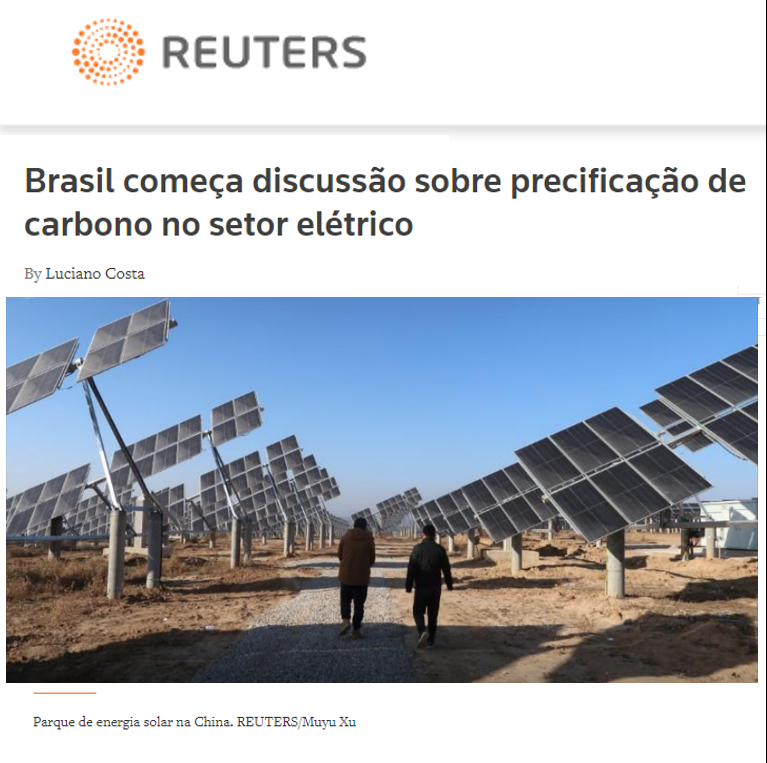“The absence of discussion about the withdrawal of subsidies for existing coal and oil thermal generation” is questioned by Sergio Leitão in an article about Temporary Measure 998

Brazil launches discussion of carbon pricing in the electricity sector
This Reuters article covers the role of climate change in the discussion on energy policy and the end of subsidies to renewables as foreseen in Temporary Measure 998. In an interview, Sergio Leitão, director of Instituto Escolhas, questions “the lack of discussion about the withdrawal of subsidies for existing coal generation and oil thermal plants.”
For Leitão, “In a country with sun and wind, you keep flirting with these things from the past … coal and fossil fuel are the sources of the past. They are there just because they are on life support.”
Check out the full article below:
Brazil launches discussion on carbon pricing in the electricity sector
By Luciano Costa
SÃO PAULO (Reuters) – Brazil has introduced the issue of climate change in discussions on energy policy, and one of the themes on the government radar is the use of carbon pricing mechanisms in the electricity sector, said the president of a state planning agency said on Tuesday.
The head of the Energy Research Company (Empresa de Pesquisa Energética – EPE), Thiago Barral, mentioned the progress made through RenovaBio, a state program of decarbonization certificates to promote the biofuels sector, and pointed out that a recent temporary measure could pave the way for similar mechanisms for the electricity sector.
“With Temporary Measure 998, we are already taking an initial step towards also bringing this discussion to the electricity sector, but looking at the sector as an exporter of decarbonization, of decarbonization certificates, ” said Barral, taking part in the online edition of the National Meeting of Electricity Sector Agents (Encontro Nacional de Agentes do Setor Elétrico – Enase), organized by the energy-focused channel CanalEnergia.
The Temporary Measure establishes that the Executive Branch has 12 months to define guidelines for the implementation of mechanisms that take into account the benefits of each energy source in terms of low greenhouse gas emissions.
At RenovaBio, mentioned by the president of EPE, fuel distributors must meet individual decarbonization targets, which can be accomplished through the purchase of decarbonization certificates (CBios) issued by biofuel producers.
Until the middle of this month, the association of the sugar-energy sector, Unica, had guarantee emission for 8.54 million CBios, about 60% of the target for 2020, citing data from the National Petroleum Agency (ANP) regulator since the start of RenovaBio, in December 2019.
The president of EPE stated that the state-owned company has yet to assess the impacts of climate change on hydroelectric generation–the flagship of the Brazilian matrix–but added that it has gradually lost space in the expansion to wind and solar plants.
The effects could involve a reduction in long-term inflows, or in the volume of water that reaches the hydroelectric dams in order to be transformed into energy.
“In some scenarios we have experienced the effect that would be felt with the reduction of inflows and its impact not only safety, but also on operating costs… in this sense, it is quite impacting, depending on the scenarios, and depending on how critical these effects (of climate change) are,” said Barral.
NO SUBSIDIES
The evaluation of mechanisms designed to estimate the benefits of energy sources in terms of emissions arrived as a counterpart to the withdrawal, provided for in Temporary Measure 998, of subsidies granted to renewables such as wind, solar and biomass plants, seen by the government as already too competitive to receive the incentive.
The end of the subsidies, which still need to be validated by Congress with the approval of the Temporary Measure, would be valid only for new projects and would feature a transition period of 12 months, during which the incentive would still be issued to new grants.
To the former director of Greenpeace and founder of Instituto Escolhas, Sergio Leitão, the withdrawal of this support for renewables is a worthy measure, given the reduction in technology costs, while the valuation mechanisms by source have the potential to become something “revolutionary and innovative.”
He pointed out, however, the lack of discussion about the withdrawal of subsidies for existing coal and oil thermal generation.
“In a country with sun and wind, you are flirting with these things from the past… coal and fossil fuel are the sources of the past. They are there subsisting precisely because they are on life support.”
The Energy Development Account (Conta de Desenvolvimento Energético – CDE), a fund fed by charges on electricity bills that cover various subsidies and social programs, mobilized 20.2 billion reais in 2019, according to a study by the Instituto Acende Brasil.
Out of this amount, R $690 million went to support national mineral coal, and R $6.3 billion went to the Fuel Consumption Account (Conta de Consumo de Combustíveis – CCC), which pays for the generation through oil thermal plants in regions that are isolated from the electricity grid, according to a study by Acende Brasil in partnership with PwC.
By Luciano Costa
Our Standards: The Thomson Reuters Trust Principles.
Originally published in: https://br.reuters.com/article/businessNews/idBRKBN26K3JH-OBRBS
Related
Brazil attended COP-6 in Minamata without presenting an action plan to address mercury usage in mining
Study shows 2,274% increase in herbicide use for soybean production
Technical assistance is prevalent in legal regulations and public policies; however, a study indicates that it does not adequately reach rural producers
Study reveals Brazil applies pesticides and fertilizers inefficiently and unsustainably in soybean farming

 Texto
Texto